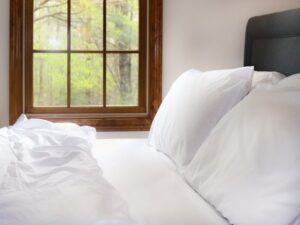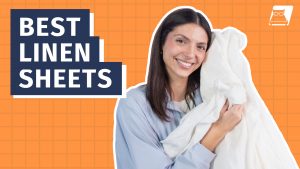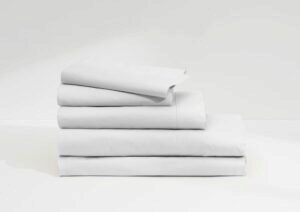Viscose vs. Cotton Sheets: What’s the Better Option?
Disclosure: By clicking on the product links in this article, Mattress Nerd may receive a commission fee at no cost to you, the reader. Read full disclosure statement.
Many people think cotton is the king of comfy sheets. But in recent years, viscose has given cotton a run for its money. So you might be wondering, is one really better than the other?
Keep reading for a detailed comparison of viscose and cotton sheets. We’ll also give you our top shopping tips to get the best bedding deals.
Viscose vs. Cotton Sheets at a Glance
Viscose and cotton are excellent materials for bed linens. Each is made from natural materials, though their production processes are quite different. Viscose and cotton are both breathable and have similar thread count ranges.
Generally, viscose sheets are silky, smooth, and soft right when you buy them. Cotton sheets tend to be crisper and sometimes require multiple washes before they feel soft.
It’s also worth noting that cotton sheets are a lot easier to care for than viscose sheets. Cotton can hold up in most wash cycles unless specified on the care instructions label. Due to its delicate fibers, viscose can break down more quickly. So, you have to stick to gentle wash cycles or handwashing.
Here’s how they compare at a glance.
| Viscose Sheets | Cotton Sheets | |
| Material | Made from wood or plant pulp | Made from the cotton plant |
| Typical thread count | 200 to 500 | 200 to 400 |
| Breathability | Very breathable, wicks away moisture | Very breathable, doesn’t wick away moisture |
| Feel | Silky, soft, and smooth | Crisp and smooth, getting softer with each wash |
| Typical care | Sensitive to wash cycles, handwashing is best | Durable in the wash unless otherwise specified on care label |
Viscose Sheets: Overview
Viscose is a semi-synthetic material. It’s derived from a blend of wood pulp – or other plant materials – which is processed and spun into yarn. The final product is soft, lightweight, and slightly shiny.
The term “viscose” refers to the liquid pulp that’s turned into fibers. Some people also call this type of fabric “rayon.”
Some of the common organic materials used to make viscose fabrics include:
- Soy
- Pine
- Beech
- Spruce
- Bamboo
- Hemlock
- Sugarcane
- Eucalyptus
Breathability
Viscose is very breathable. Its porous material lets air flow freely and doesn’t trap body heat. It also wicks away moisture, making it a perfect pick for sweaty summer months or hot sleepers.
Thread Count
The average thread count for viscose sheets is 200 to 400. While 200 can be very comfortable, 400 may be softer. Anything over 400 tends to come with a heftier price tag but without a significant difference in comfort or quality.
Durability
Viscose isn’t the most durable material you can buy. The delicate fibers break down when it gets wet, weakening the structure. This can lead to premature wear and tear.
Maintenance
Since viscose isn’t very durable, you need to be careful when you wash your sheets. Be sure to read the care instruction labels carefully. You also may prefer to handwash them to ensure maximum lifespan.
The good news? Viscose holds color dyes very well. So even if you wash them, they should retain a vibrant color.
Feel
Viscose has a silky, soft, and smooth feel. In fact, it’s probably the best affordable alternative to real silk.
Variety
Viscose is very versatile, with a wide variety of sheet set options available in stores or online. You can even pick some out based on your plant of choice. Bamboo, for example, is very popular.
Viscose Sheets Pros and Cons
Pros
- Affordability. Viscose is a cheaper alternative to silk or other high-end materials.
- Breathability. Viscose fabric is breathable, making it an excellent option for hot sleepers.
- Hypoallergenic. Thanks to its natural fibers, viscose is hypo-allergenic. This makes it a top-notch pick for people who have sensitive skin.
- Stylish. Viscose fabric tends to hold dyes well. So even after many washes, the designs should still stay vibrant. Additionally, viscose has a free-flow feel that drapes well.
Cons
- Mildew. Like a lot of other porous fabrics, viscose is prone to mildew.
- Sunlight. Viscose fabric has been known to deteriorate in bright sunlight.
- Laundry care. Viscose fabrics can shrink in the wash, so you have to be mindful of the washer settings.
- Not elastic. Viscose fabric isn’t elastic. Though, you can find options blended with spandex and other stretchy materials.
Shopping Tips for Viscose Sheets
- Price. Viscose tends to be more expensive than cotton, but you can still get a great deal. Shop around until the price is right.
- Weave. If you prefer a silkier feel, opt for a sateen weave. For a more classic vibe, go with twill or percale.
- Environmental impact. Viscose has a more significant impact on the environment than cotton. But you can try to look for environmentally friendly and ethical brands.
- Stretchiness. If you want your sheets to have a bit of a stretch, go with bedding blended with materials like spandex.
Cotton Sheets: Overview
Cotton is arguably the world’s most popular fabric. It’s derived from the cotton plant, which is turned into yarn and then woven into cloth. The cotton plant is soft and fluffy, creating smooth, durable, and breathable bedding.
Breathability
Cotton is one of the most breathable fabrics on the market. It can keep you cool all night long and shouldn’t be too harsh on sensitive skin.
Thread Count
The most popular thread count for cotton sheets ranges from 200 to 400. Some folks swear by a thread count of 400 and up. But honestly, most people can’t tell the difference.
Durability
Cotton is very durable. It can go through the wash many times without wearing it down. It can last even longer if you follow the special care instructions.
Maintenance
Maintaining cotton bedding is easy, thanks to its impressive durability. But if you store it for long periods of time, you may want to use an air-tight seal to prevent mildewing. Mothballs can also come in handy to ward off any unwanted critters.
Feel
Cotton has a soft, crisp feel. Higher thread counts tend to be a bit softer, but 200 thread count sheets can also be great.
Washing your cotton sheets a few times before you use them can make them softer.
Variety
There are thousands of options to choose from. You can find cotton linens at almost any retail store that sells bedding. You can also easily find high-quality cotton sheets online.
Cotton Sheets: Pros and Cons
Pros
- Durability. Cotton is very durable. Cotton sheets can last years when cared for correctly.
- Price. You can find high-quality cotton sheets for a very low price in stores or online.
- Versatility. Cotton sheets will keep you cool in the summer and can be layered to keep you warm in the winter.
- Safe for sensitive skin. Organic cotton that’s free from dyes shouldn’t bother your skin.
Cons
- Quality counts. Some cotton sheets are made from lower-quality cotton, giving it a scratchy feel.
- Wrinkling. Cotton is prone to wrinkling. Psst. You can avoid this by using wrinkle guard dryer sheets.
- Shrinkage. Even though it’s durable, cotton can shrink in the wash. Poorer quality cotton can also thin over time.
Shopping Tips for cotton Sheets
- Fiber content. Cotton/polyester blends are often more affordable than 100% cotton sheets. But they might give the bedding a more synthetic feel.
- Thread count. Again, just because sheets have a high thread count doesn’t mean they’re worth the price tag. Anything from 200 to 400 is generally very comfortable.
- Weaves. Like varicose, cotton comes in a variety of weaves. Percale weaves have a crisp and light feel, while sateen is silkier.
Who Would Prefer Viscose Sheets?
You might prefer viscose sheets if you:
- like the feel of silk
- have sensitive or allergen-prone skin
- want a breathable fabric that wicks away moisture
- are okay with spending extra time caring for your linens
- don’t want to spend a lot of money on high-quality bedding
Who Would Prefer Cotton Sheets?
You might prefer cotton sheets if you:
- have sensitive skin
- want an easy-to-find option
- want durable, washer-friendly sheets
- need an affordable option that’s easy to care for
Popular Viscose Sheets
Looking to buy viscose sheets? Here’s a quick rundown of the most well-known brands.
Premium 100% Austrian Eucalyptus Lyocell Tencel Sheet Set by Sijo
These eucalyptus sheets by Sijo were voted “The Best cooling Sheets of 2022” by Architectural Digest. They’re made from sustainably-sourced eucalyptus and contain no harmful dyes or chemicals.
You can order them online in various colors like forest, blush dove, fog, ivory, sky, white, pebble, or slate.
Bamboo Sheets by BEDSURE
BEDSURE’s Bamboo Sheets are 100% viscose made from organic bamboo. The queen set comes with two pillowcases, one flat sheet, and one fitted sheet at a great rate.
There are 15 colors to choose from, so there’s a good chance they’ll have something that suits your style.
Bamboo Sheets Bed Sheet Set by Sonoro Kate
These silky sheets are made of 100% organic bamboo. The king set has one flat sheet, one fitted sheet, and four pillowcases. They will fit most mattresses that are under 22 inches deep.
The fitted sheet also has a durable elastic border to keep it snug on your mattress.
Popular Cotton Sheets
Here are three cotton sheet sets that won’t break your budget.
100% Cotton Sheets by California Design Den
Looking for sheets that are buttery soft, and incredibly cool? Look no further. These 100% cotton sheets from the California Design Den Store are the best of both worlds. They’re an excellent option for hot sleepers or during the summer.
On top of being high-rated and comfortable, they come in 21 colors.
100% Organic Cotton Sheet Set by Lane Linen
These sheets by Lane Linen prove you don’t have to spend big bucks on high-quality cotton. The organic cotton sheets boast a percale weave for optimal breathability and comfort. Reviewers say they’re very soft and don’t lose luster after multiple washes.
They only fit mattresses up to 15 inches deep, though.
100% Organic Cotton Bed Sheet Set by Sleep Mantra
These 100% organic cotton sheets are non-toxic and chemical-free. They also meet the requirements of the Globa Organic Textile Standard (GOTS). Reviewers say the sheets are crisp, cool, and light.
Looking for more organic options? Check out our review of Saatva Organic Sateen Sheets here.
Frequently Asked Questions
What are the disadvantages of viscose?
Viscose isn’t very durable and requires extra care when washed. Additionally, it tends to be a bit more expensive and harder to find than cotton.
Is viscose more breathable than cotton?
Viscose and cotton are both very breathable. The main difference is that viscose wicks away moisture, and cotton does not.
Is viscose a good quality fabric?
It all depends on the brands you buy from. But generally, viscose sheets are a great, high-quality option.
Takeaway
Viscose and cotton are great fabric options for your sheets. They’re both:
- Breathable
- Comfortable
- Budget-friendly
- Easy to find in stores
You might prefer cotton if you want a more durable fabric that is easy to care for. But viscose might be your best bet if you prefer a silky-smooth, moisture-wicking material that doesn’t retain heat.


